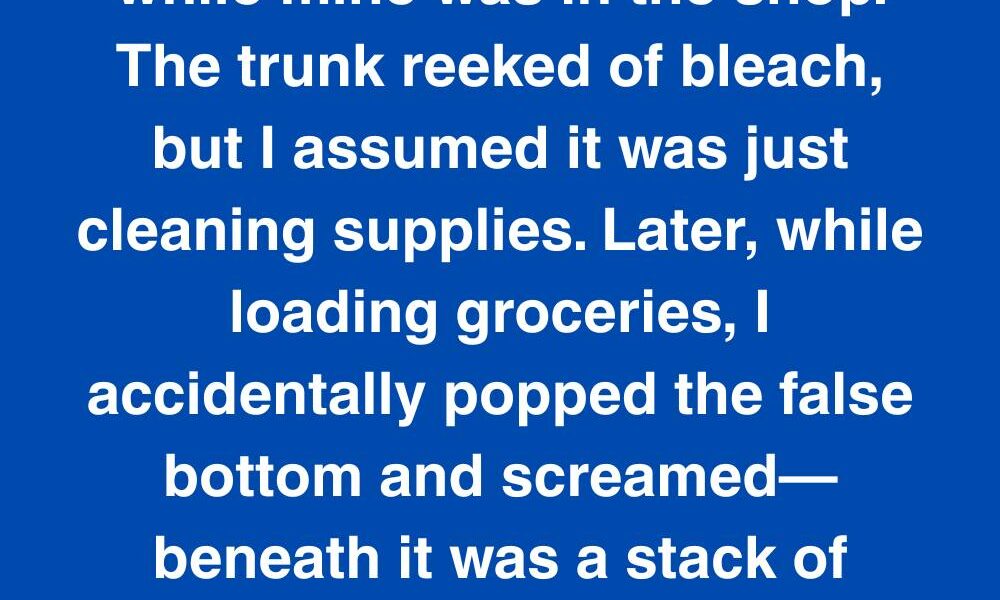I borrowed my sister’s car while mine was in the shop. The trunk reeked of bleach, but I assumed it was just cleaning supplies. Later, while loading groceries, I accidentally popped the false bottom and screamed—beneath it was a stack of envelopes, all addressed to our mom.
They weren’t normal letters. Each one had no return address and was sealed with red wax. My hands trembled as I picked one up. The handwriting was unmistakable—my sister’s, neat and curved, the way she used to write notes when we were kids.
I glanced around the parking lot, suddenly paranoid, then stuffed the envelopes back in and slammed the trunk. On the drive home, my thoughts raced. Why would she hide letters to Mom in a fake trunk compartment? Especially when Mom had passed nearly three years ago.
When I got home, I pulled the stack out again, this time laying them on my kitchen table. I opened the first one carefully, half expecting it to explode or dissolve. But inside was a simple, handwritten note:
“Dear Mom, I lied about something. I need to say it now, even if no one ever reads this.”
That was it. No signature, no details. Just a confession hanging in the air like fog. I opened the second.
“Dear Mom, I took the money from Dad’s drawer. Not Mark. I let him take the blame.”
I dropped the letter and sat down hard. Mark was our cousin. He lived with us for two years in high school after his parents split. Dad had always suspected Mark stole from him, and it caused a permanent rift.
I opened the third. Then the fourth. Each letter was a new confession. Some were small—breaking a neighbor’s vase and letting the dog get blamed. Others were bigger. Hiding the results of a failed college exam. Cheating on her boyfriend of six years with someone at work.
By the twelfth letter, I couldn’t breathe. I had no idea my sister was carrying this much weight. She always looked so put together—clean car, great job, perfect hair. But under all that polish was someone unraveling in secret.
I didn’t confront her right away. I couldn’t. She’d never shared any of this with me, not even hinted. We were close in the way sisters sometimes are—brunches, texts, birthday calls—but not the type to bare our souls.
Two days later, I finally called her.
“Hey,” I said, trying to sound normal. “Your car’s back in the driveway. Thanks for letting me borrow it.”
“No problem,” she said, breezy as ever. “Hope the bleach smell didn’t bother you. I spilled a bottle in the trunk last week.”
I paused. “Yeah… about that. I found something under the trunk lining.”
Silence.
“You went under the liner?” Her voice dropped.
“It popped open when I was loading groceries. The letters were just… there.”
Another long pause. “You read them?”
“I didn’t mean to,” I said, gently. “But yeah. I did.”
She exhaled, shaky and uneven. “God. I was going to burn them.”
We sat in silence for a moment, just breathing together over the phone.
“Why were they addressed to Mom?” I finally asked.
“Because I couldn’t say it out loud to anyone else,” she whispered. “She was the only one I ever felt fully safe with.”
I swallowed hard. “You never told me any of this. Not one thing.”
“I couldn’t,” she said. “You were always the good one.”
That stung. Not because it was true, but because it wasn’t.
“I’m not perfect,” I said. “You just never asked.”
We didn’t talk long after that. Just enough to agree to meet later that weekend.
On Saturday, she came over with wine and a bag of kettle chips, like we used to do during movie nights growing up. We didn’t play a movie, though. We sat on my couch and talked.
For hours.
She told me how the guilt had piled up over the years. How, after Mom died, it started eating her alive. Writing those letters was a way to cope, to confess without judgment. She never intended anyone to read them.
I told her I was sorry she’d been holding so much in alone. And that I had secrets too. Not as dramatic, maybe, but still real. Like the time I let her take the fall for scratching Dad’s car. Or how I used to read her journal when she left it unlocked.
She laughed at that—really laughed. It felt good, like a window cracked open in a stuffy room.
We agreed not to destroy the letters just yet. Instead, we put them in a shoebox and tucked it into my closet.
“I might still burn them,” she said, but her voice was softer now. “Just not today.”
Weeks passed. Life went on. But something shifted between us. We called more. Shared more. There was a rawness to our conversations that hadn’t been there before.
One Sunday afternoon, I was folding laundry when she called.
“Can I tell you something else?” she said. “Something I never wrote down.”
“Of course.”
She took a breath. “Do you remember Noah?”
I blinked. “Your old boyfriend? The teacher?”
“Yeah. I was pregnant.”
Silence.
“I didn’t keep it,” she added quietly. “I didn’t even tell him. It was years ago, but I still think about it. A lot.”
I sat down slowly.
“I’m not judging,” I said. “Thank you for telling me.”
She let out a small sob. “I thought you might hate me.”
“I don’t,” I said. “Not even close.”
In that moment, I realized something. Sometimes the strongest people are just the best at hiding their pain. And sometimes, what someone needs most isn’t advice or judgment—it’s just space to be human.
Months passed. The letters remained in my closet, untouched. Then something happened that flipped everything.
Our dad passed away. It wasn’t sudden—he’d been sick for a while—but it still felt like the world tilted.
The funeral was small, just family and a few old friends. My sister held it together, mostly. I cried through most of it.
Afterward, as we sorted through Dad’s house, we found something we hadn’t expected.
In the attic, tucked inside a military footlocker, were dozens of envelopes.
All addressed to Mom.
They were from Dad. Letters he’d written after her death. Most of them were apologies. Regrets. Little updates on our lives.
We read them together, side by side on the old living room floor. My sister’s hands shook as she opened one with our names in it.
Inside, he wrote about how proud he was of us. How sorry he was for the times he raised his voice. How he wished he’d loved more out loud.
By the end, we were both crying.
Maybe we came from a family that didn’t say things directly, but we felt them deeply. And in our own ways, we found ways to speak—through letters, through whispers, through messy conversations over kettle chips and wine.
A few weeks after that, I came home to find my sister on my porch, holding the shoebox.
“I’m ready,” she said.
We drove to the lake we used to visit as kids. There was a little firepit there, meant for campers. We lit the fire and fed the letters in, one by one.
She read each one out loud before letting it go. Some made us laugh. Others made us cry. All of them felt like old ghosts finally leaving.
When the box was empty, we sat back and watched the embers die.
“I don’t feel lighter,” she said. “But I feel clearer.”
“Maybe that’s enough,” I said.
We hugged tight. Not the kind of hug you give just to be polite, but the kind that says, I see you. I love you. I’m here.
Life isn’t about being perfect. It’s about being honest. And sometimes honesty takes time.
A year later, we’re closer than ever. We still have our messes, our old habits, our baggage. But now, we also have each other—fully, openly, truthfully.
We started a tradition, too. Every New Year’s Day, we write letters to people we’ve lost or things we need to let go of. We burn them at the same lake.
It’s not magic. But it helps.
If there’s one thing I’ve learned through all this, it’s this: hiding your pain doesn’t make it disappear. It just makes it heavier. And the minute you speak it—whether through a letter, a conversation, or a tear-filled porch talk—it starts to lose its grip.
So if you’re carrying something heavy, I hope this gives you permission to put it down.
Tell someone. Write it out. Share it. Let it breathe.
You might be surprised at how much lighter the world feels when you do.
If this story meant something to you, share it. You never know who needs to hear it. And if you’ve been holding something in, maybe today’s the day to let it go.



